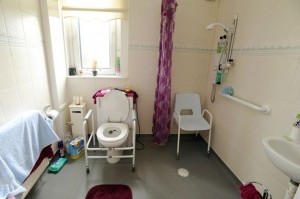
Alasdair MacLeod/Daily Record
By Raya Al Jadir
New research will investigate the “untold stories” of disabled lesbian, gay, bisexual and transgender (LGBT) people in the social care system.
The study will explore the experiences of LGBT disabled men and women who use direct payments or personal budgets to fund their social care.
It has been launched by the disabled LGBT organisation Regard, the gay rights charity Stonewall, the Norah Fry Research Centre at the University of Bristol and the Social Care Institute for Excellence (SCIE).
Dr Ju Gosling, co-chair of Regard, said: “We know almost nothing about the use and experiences of using social care support by LGBT disabled men and women, because to date no-one has asked.
“This is despite the fact that as many as one in three LGBT people are disabled.
“We are also disproportionately represented among social care-users, because we are less likely to live in the area we grew up, and less likely to have children and family members to support us, than other disabled people.
“Apart from initial decisions to ‘come out’, social care-users may well need support to access LGBT venues, take part in social activities with other LGBT people, facilitate other ‘ordinary’ daily aspects of being LGBT, and require physical support with sex (alone or with others).
“LGBT people with learning difficulties may need particular support to assert and/or explain their needs as they relate to sexual identity.”
She added: “The research findings will be used to influence the future delivery of social care and training of social care workers, as well as to raise awareness of the issues facing LGBT disabled people more generally.”
Gosling said that Regard continued to work with the Care Quality Commission (CQC) and SCIE to raise awareness of the needs of LGBT people who use social care, and previously worked with CQC’s predecessor, the Commission for Social Care Inspection (CSCI), to draw up the first guidelines for care homes on LGBT equality, which remain in place.
Pete Fleischmann, SCIE’s head of co-production, said his organisation’s interest in the issue dated back to 2008 when research by CSCI found 45 per cent of LGBT people experienced discrimination when using social care services.
He said: “They also found that only six per cent of providers had carried out any sort of equality work around sexual orientation, when a third of the providers promoted race or disability equality.”
He said SCIE had a “long-standing interest in these issues because of the untold stories of LGBT people within the social care services”.
SCIE has produced six films covering the issues LGBT service-users face when using a range of social care services, and a briefing on LGBT issues and personalisation, and plans to launch two more films, one aimed at service-users and one at professionals, and briefings, as a result of the research.
Fleischmann said that social care service-users “don’t just come out once, it is a continual process because you are always encountering new professionals, new assessments, with various forms of support, with a big turnover of staff… that is really difficult for people.
“Personalisation is a real opportunity for LGBT people to commission their own services, feel comfortable and in control, and until we do the interviews we know nothing about this area at all.”
Professor David Abbott, head of the school for policy studies at Bristol University and associate director at the National Institute for Health Research’s school for social care research – which is funding the study – said that one of the main things that LGBT people with learning difficulties talked to him about for a study two years ago was “the difficulty they had in coming out to support staff”.
He said: “Some were anxious about the response of the [support worker or staff] and some felt they had to keep it a secret or hidden, anticipating only some of the support workers would be sympathetic.”
Regard has told him examples of support workers “being quite critical or homophobic, saying quite unpleasant things to disabled people when they came out or refusing to go to venues saying it is not part of their job description or it might not adhere to their belief system”.
He said he hoped the research would discover when sexuality was being raised during social care assessments and reviews.
He said: “Do people feel able to say, ‘Actually, one of the things I will need support with is going to Pride or gay bars to meet other people of my community.
“We don’t know if that actually comes up or not and we may find some really positive and nice examples of how support workers and PAs (personal assistants) and their employers work together to help the disabled person get their needs.
“We are not necessarily starting with the assumption that we are just going to find really poor practice examples; we are open to finding what are people doing and how are they managing these relationships and overcoming the difficulties.”
The study will involve a survey of more than 100 LGBT adults who use direct payments or personal budgets to fund their social care, followed by 30 anonymous, confidential, in-depth interviews.
There will also be two focus groups with PAs from Independent Living Alternatives, the agency founded by the late disabled activist David Morris.
The research findings are expected to be published in April 2017.
19 May 2016

No responses yet